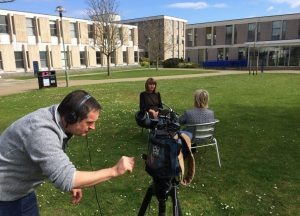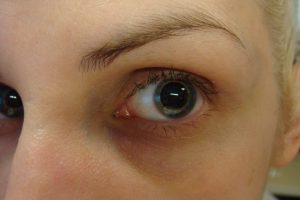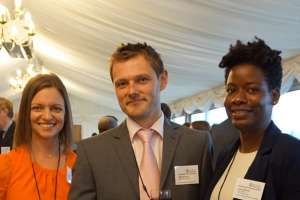CISoR scientists scored well in Kent’s third annual Research Prizes, which took place on 21 April, with three of the 16 awards handed out to staff in recognition of their accomplishments over the last year.
The awards recognised achievements such as publication in top-ranked journals, high citation rates, significant funding awards and impact through public engagement and policy development.

Specifically, the CISoR winners were as follows:
The University Prize for Postgraduate Research was awarded to Dr Becky O’Connor (5th from right) in recognition of an exceptional publication record, including a potential 4* publication, and achievements far beyond those normally expected of a doctoral student. As part of a project in the Griffin Laboratory Becky O’Connor examined the links between dinosaur and modern avian genomes, using a combination of lab-based and computational means. This allowed the laboratory to learn more about the evolution of bird genomes, and develop new products and processes along the way. The work has proved that a so-called typical avian genome structure became established much earlier than previously thought, about the time that the dinosaurs first emerged. These results were considered so significant that they were accepted by one of the most highly cited journals in the world, Genome Research. In addition, Becky has been involved in the development of Chromoprobe Multiprobe devices, a pig chromosome infertility screening service, has written 2 small grants (£10,000 each) and been named investigator and co-author on a large BBSRC grant which has recently been funded. In nominating Becky, Prof Darren Griffin stated that, ‘even by the standards of a high-flying academic, this has been an outstanding year, and PhD, for Becky. To get a single 4* paper as a result of a PhD would be considered exceptional. For it to be the centre piece of a suite of 5 papers has me reaching for superlatives. ‘Becky was awarded her PhD “without corrections”, and I know of only one other person who has done this. Such achievement could not have been better deserved.’ Becky previously was a Graduate of the CISoR MSc in Reproductive Medicine: Science and Ethics.
The Faculty of Sciences Prize for Advanced Research was awarded in recognition of Prof Darren Griffin’s (far left) outstanding contribution to the field, his publication and income track record, his impact activity and his achievements in nurturing and facilitating ground-breaking interdisciplinary work. Prof Griffin is a key figure in genomic research and has made significant breakthroughs, such as the development of the first clinical application of a universal test for diagnosing disease in IVF embryos. His publication record, research and innovation income, impact and public engagement activity all attests to his standing and achievements in the field, including over 150 publications in some of the world’s highest impact journals e.g. Science, Nature, Nature Genetics and Genome Research; £6.5m research grant income as principal investigator; the most citations for any academic in the University and the second highest h-index (SciVal); over £1m of innovation funding, the highest for any single academic in the University; the most viewed articles by journalists; and supervising 20 PhD students to completion. In nominating him for the prize, Prof Alan Thornhill emphasised that ‘an outstanding researcher in his own right, his work in working collaboratively gives the University of Kent incredible international kudos from the point of view of the outside observer, combining excellence in social, scientific and clinical research.’
The University Prize for Advanced Research awarded to Prof Adrian Podoleanu (6th from left) in recognition of outstanding achievements in developing the field of optical coherence tomography (OCT), founding a strong and successful research group, and Prof Podoleanu’s record of internationally leading publications, patent protection and extensive grant income. Prof Podoleanu produced the first en-face OCT image of the human retina in 1996, and has since developed an international reputation in the field. He has attracted more than 30 grants worth over £6m, including three European Research Council awards, two Marie Curie training sites, and three major EPSRC grants. In nominating him for the Prize, his Head of School Prof Mark Green stated that ‘Prof Adrian Podoleanu is one of the leading physicists in the country. He has developed biomedical optical technology that is treating thousands of patients with eye problems per year worldwide, and has adding millions to the UK economy. ‘He is an example of nurturing interdisciplinary links between specialists in different disciplines in the Faculty of Sciences and of promoting PG education mixed with entrepreneurship. I don’t believe there is anyone in the history of science at the University of Kent that has done more to increase the international research profile of the University. As the Royal Society and the UK government has recognised this so publicly in 2015, he unquestionably deserves accolade from Kent in the form of the University Advanced Research Prize this year.’
The ceremony was hosted by Professor Catherine Richardson from the School of English, and the awards were presented by the Pro-Vice-Chancellor for Research and Innovation Professor Philippe De Wilde during a gala dinner held at the Darwin Conference Suite at the University’s Canterbury campus.
Professor De Wilde commended the high quality of applications received and congratulated the winners on their success: ‘The nominations highlighted the diversity of research, and the impressive achievements for which Kent academics and students are responsible. Such excellence made selecting sixteen winners particularly difficult, and as well as congratulating the winners I would like to thank all those who put their work forward for consideration. It has shown me how much excellent work is being undertaken, how many publications and grants are being secured, and how many accolades are being won.’
The Research Prizes scheme has generated considerable interest across the University since its launch in 2014 and this year 44 applications from 13 of the University’s Schools were submitted.
Further details of all the prize-winners are available on the Research Prize website.






